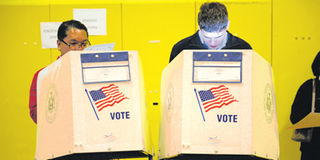Trump won with lowest minority vote in decades, fuelling divisions

Americans vote during the November 8 presidential election. Donald Trump won the US presidency with less support from black and Hispanic voters than any president in at least 40 years, according to a new poll. PHOTO | FILE
What you need to know:
- Trump was elected with 8 per cent of the black vote, 28 per cent of the Hispanic vote and 27 per cent of the Asian-American vote, according to the Reuters/Ipsos Election Day poll.
Donald Trump won the US presidency with less support from black and Hispanic voters than any president in at least 40 years, a Reuters review of polling data shows, highlighting deep national divisions that have fueled incidents of racial and political confrontation.
Trump was elected with 8 per cent of the black vote, 28 per cent of the Hispanic vote and 27 per cent of the Asian-American vote, according to the Reuters/Ipsos Election Day poll.
Among black voters, his showing was comparable to the 9 per cent captured by George W. Bush in 2000 and Ronald Reagan in 1984. But Bush and Reagan both did far better with Hispanic voters, capturing 35 per cent and 34 per cent, respectively, according to exit polling data compiled by the non-partisan Roper Center for Public Opinion Research.
And Trump’s performance among Asian-Americans was the worst of any winning presidential candidate since tracking of that demographic began in 1992.
The racial polarization behind Trump’s victory has helped set the stage for tensions that have surfaced repeatedly since the election, in white supremacist victory celebrations, in anti-Trump protests and civil rights rallies, and in hundreds of racist, xenophobic and anti-Semitic hate crimes documented by the Southern Poverty Law Center (SPLC), which tracks extremist movements. The SPLC reports there were 701 incidents of “hateful harassment and intimidation” between the day following the Nov. 8 election and Nov. 16, with a spike in such incidents in the immediate wake of the vote.
Signs point to an ongoing atmosphere of confrontation.
The Loyal White Knights of the Ku Klux Klan, a white separatist group that vilifies African-Americans, Jews and other minorities, plans an unusual Dec. 3 rally in North Carolina to celebrate Trump’s victory. Left-wing and anarchist groups have called for organized protests to disrupt the president-elect’s Jan. 20 inauguration. And a “Women’s March on Washington,” scheduled for the following day, is expected to draw hundreds of thousands to protest Trump’s presidency.
American politics became increasingly racialized through President Barack Obama’s two terms, “but there was an attempt across the board, across the parties, to keep those tensions under the surface,” says Jamila Michener, an assistant professor of government at Cornell University.
Trump’s anti-immigrant, anti-Muslim rhetoric “brought those divisions to the fore; it activated people on the right, who felt empowered, and it activated people on the left, who saw it as a threat,” she added.
That dynamic was evident last week.
When Vice President-elect Mike Pence attended the Broadway musical “Hamilton” in New York on Friday, the multi-ethnic cast closed with a statement expressing fears of a Trump presidency. A far different view was on display the next day as a crowd of about 275 people cheered Trump’s election at a Washington conference of the National Policy Institute, a white nationalist group with a strong anti-Semitic beliefs.
“We willed Donald Trump into office; we made this dream our reality,” NPI President Richard Spencer said. After outlining a vision of America as “a white country designed for ourselves and our posterity,” he closed with, “Hail Trump! Hail our people! Hail victory!”
Though Trump’s election victory was driven by white voters, his performance even among that group was not as strong as some of his predecessors. Reagan and George H.W. Bush both won the presidency with higher shares of the white vote than the 55 per cent that Trump achieved.
The historical voting patterns reflect decades of polarization in American politics, but the division surrounding Trump appears more profound, says Cas Mudde, an associate professor specializing in political extremism at the University of Georgia.
The writer filed this article from Washington




